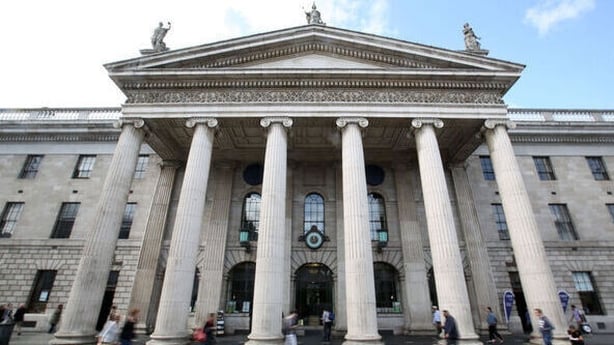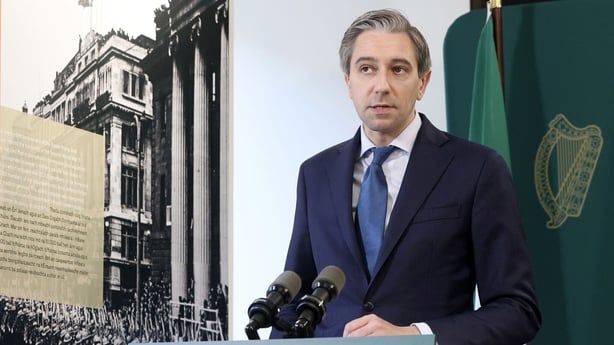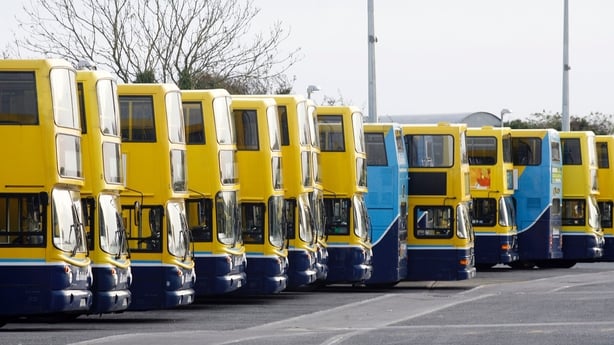The Dublin City Taskforce has recommended that 1,000 extra gardaí be deployed to ensure greater security in the city centre.
The group, chaired by An Post Chief Executive David McRedmond, also suggested that a congestion charge or tourist tax could be used to raise some of the estimated €750 million to €1 billion in capital funding required to implement its recommendations.
The taskforce was established last May to come up with a plan revitalise the capital in the wake of the November 2023 riots and the Covid-19 pandemic.
Speaking at the publication of the report, Mr McRedmond said while it was beyond the group's remit to say what taxes should be collected to fund the revitalisation of Dublin, "it's saying what happens in other cities. Tourist taxes are in almost every city in Europe, and raises considerable funds, mainly to maintain the public realm, to maintain the streetscape, to maintain greenery".
"And that's really effective, and tourists are used to it, but I don't know what the impact would be in the sector, so that's really an issue for Government.

"A congestion charge, likewise. Dublin is the third most congested city in Europe, and now with the Dublin city traffic plan, that's helping that greatly, and we endorsed that even before it was launched, and it's fantastic to see it doing so well," he said.
Asked whether an impending general election would slow the pace of change, Mr McRedmond said: "The Taoiseach has called together the main departments in government that have to deliver this, and he wants their plan before Christmas, and that will be delivered for whoever the government is...Dublin cannot wait another four or five years. If we wait four or five years, we'll get left behind as a city."
Taoiseach Simon Harris said his department will convene an interdepartmental group to work on the and told those gathered at the GPO that it and O'Connell Street had always been the beating heart of the city.
He said Dublin is a capital for everyone.
The report outlines ten suggestions to improve the security and condition of the capital over the coming years.
On security, the taskforce recommended the deployment of 1,000 extra gardaí over the next three years.
It said that Dublin falls short of the European average of police to residents in the city, with one garda per 373 inhabitants compared to the EU average of one police officer per 293 inhabitants.

It also said there are a number of gardaí involved in non-policing work in the city centre that could be carried out by other agencies.
The report suggested an increase in private security on public transport and a broadening of their powers.
It recommended a community warden scheme and the relocation of the garda station on O'Connell Street to the GPO.
Minister for Justice Helen McEntee welcomed the report and said she wants to see more gardaí across the country.
Speaking to RTÉ's Drivetime, she said the number of people going through the Garda College had significantly improved in the last two years.
She said it would take a number of years to reach the target of 15,000 gardaí or more, but added that she wanted to achieve the goal "as quickly as possible".
"We can publish a report and it can sit there, or we can act on it, and the Taoiseach has said very clearly that the next step will be to put together an implementation group to look at all of the recommendations," the minister said.
The president of the Garda Representative Association said he would treat the recommendation of 1,000 extra gardaí with a "guarded welcome".
Speaking on the same programme, Mark O'Meara said they had been promised additional gardaí before but it has "repeatedly failed to materialise".
He said around 300-400 gardaí a year are allocated to Dublin from the garda college, which is more than the 1,000 gardaí promised over three years for Dublin.
"That's over 1,200 gardaí over three years coming from the garda college, and we need far more than that figure to have any meaningful and effective change, you'd need to double that," he said.
"Any improvement in working conditions for our members we welcome that, but the real and substantive issue here is the recruitment and retention of our members."
We need your consent to load this rte-player contentWe use rte-player to manage extra content that can set cookies on your device and collect data about your activity. Please review their details and accept them to load the content.Manage Preferences
On the issue of services for vulnerable people, the taskforce said they should be more targeted and better located.
It suggested a more equitable spread of emergency accommodation and processing services around the Greater Dublin Area.
Mobile supervised drug consumption services in the city centre are among the recommendations to deal with drug use in the capital.
To improve housing, it suggested that derelict sites be converted into high-density residential units with provision for essential workers to tackle the issues that businesses face in recruiting staff.
It also suggested the regeneration of all city centre social housing within five years to deal with the issue of deprivation.
Revitalising O'Connell Street and redeveloping the GPO have also been proposed.
The taskforce recommended that the GPO has a greater public function and that a decision on the future of the former An Post headquarters be made next year.
The group suggested accelerating the next phases of the Dublin City Transport Plan, doubling 24-hour bus services and improving late night taxi availability by increasing fares.
It also proposed the creation of more reasons for people to visit the capital, including increasing cultural spaces, extending the opening hours of cultural venues, funding the nighttime economy and a more coordinated approach to event planning to ensure it is more evenly spread over the year.
A dedicated waste management plan for the city has also been recommended, including the ending of bagged waste and a single waste management provider for the city centre.
It also said the return of waste management to the local authority should be considered in the long term.
However, it said this should be on a phased basis as the immediate return to such a system is not feasible and may be subject to legal challenge.
A marketing strategy for the capital is also recommended as is a public vote on a directly-elected mayor for the capital.
The taskforce said that its proposals are not costed but would require an estimated €750m-€1bn in capital funding and €100m to €150m in annual expenditure.
It said that a tourist tax, a congestion charge, or increased vacant property levies could help raise the funding required along with a number of other mechanisms.

Taskforce needs delivery plan
Social Democrats TD for Dublin Gary Gannon said that while he agreed with the taskforce plan, it was a way to generate publicity without doing anything.
Speaking on the same programme, he said the report had been on the Taoiseach's desk for weeks and no funds in the Budget were allocated to a potential plan.
"The Taoiseach came before a rake of media today in the GPO and announced some very good measures, certainly nothing innovative," Mr Gannon said
"A lot of it was announced before with absolutely no plan of how it would be delivered."
He said a directly elected mayor would make a substantial difference to the capital as "absolutely nobody is held to account" for decisions that are made in Dublin.
Meanwhile, Primark/Penneys has welcomed the launch of the Dublin City Taskforce Report.
Head of Penneys Ireland and Northern Ireland Fintan Costello said that with the retailer's global headquarters on Parnell Street and two flagship Penneys stores on Mary Street and O'Connell Street, the company has been at the heart of Dublin's city centre for over 50 years.
"We want to see Dublin city centre at its best: a thriving, healthy place to live, work and enjoy. Retail plays a key role in all of these," he said.
"While we welcome the progress made to date, today's report is a critical step in the journey to delivering a better Dublin for all and investment in safeguarding the future of our much loved city. We hope the recommendations are resourced and enforced as a priority, we are certainly committed to doing whatever we can to support," he added.
Additional reporting Eleanor Burnhill







